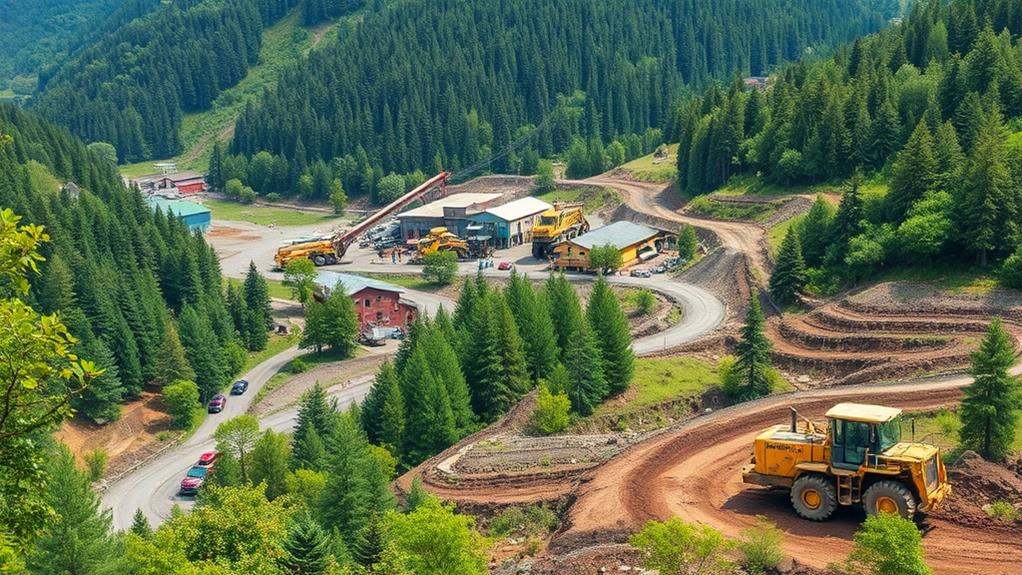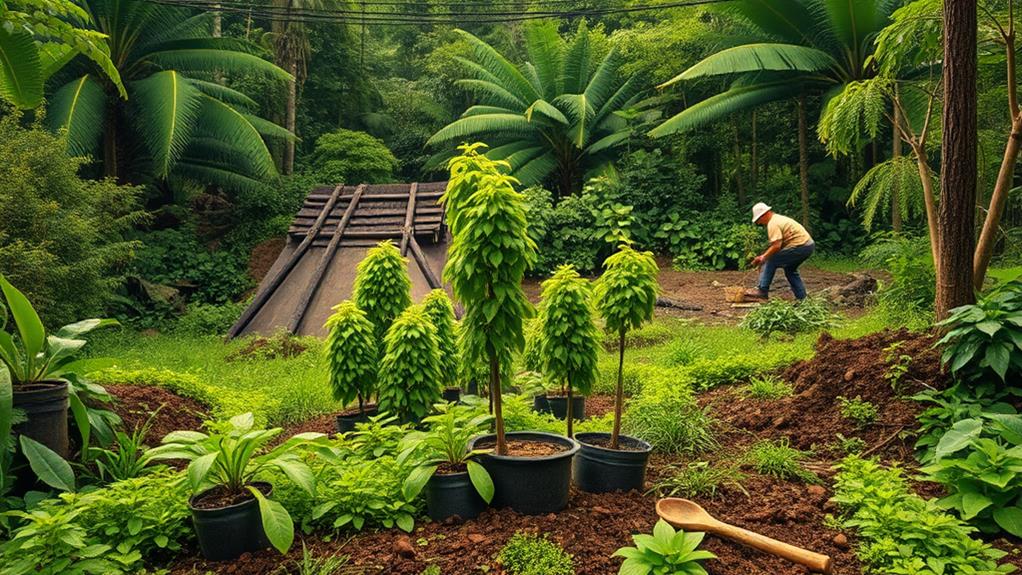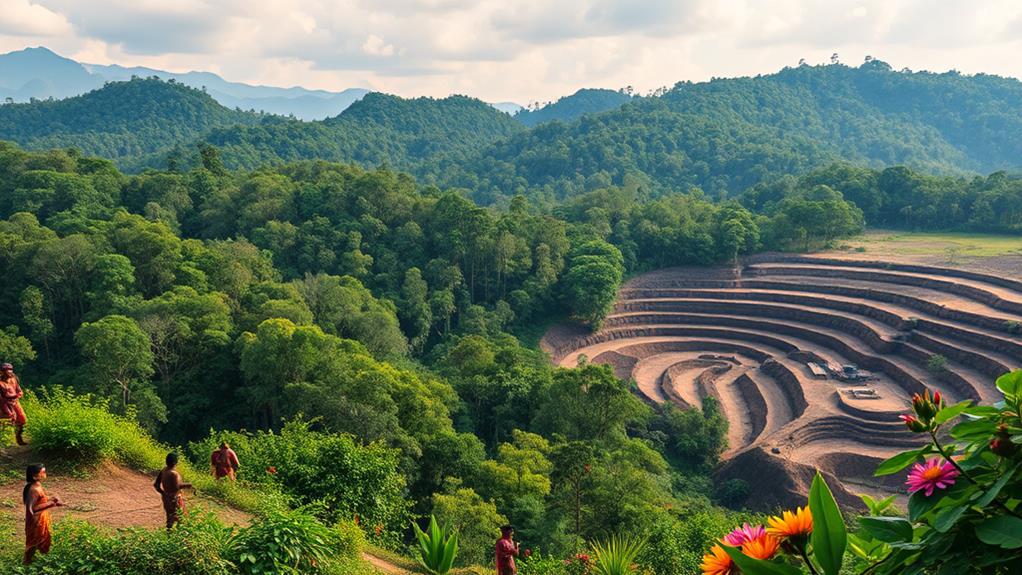Promoting responsible mining and forestry practices in the Philippines is crucial for economic growth and environmental health. These practices include using green technology and involving local communities.
For example, the Rio Tuba Nickel Mining Corporation has successfully restored ecosystems through these methods.
Working with local organizations is important for reforestation and protecting Indigenous rights. This means ensuring that communities give informed consent before mining projects begin.
The government is focusing more on sustainable practices, which helps strengthen communities and preserve biodiversity.
These combined efforts can shape a better future for the Philippines by promoting both economic development and environmental care.
Economic Impact of Mining

Mining in the Philippines is a key driver of economic growth. The country has significant mineral reserves valued at about USD 1 trillion. As the fifth most mineralized country in the world, the Philippines can effectively use its minerals.
The mining industry creates jobs, increasing employment from 180,000 in 2020 to 208,000 in 2022. This shows how mining can help local communities and promote economic stability.
In 2023, metal production increased by 8.06% in the first half of the year, adding P123.07 billion to the economy. The total mineral exports reached nearly USD 2.865 billion, making mining crucial for national revenue, especially during tough times.
To maintain this growth, it's vital to follow responsible mining practices that protect the environment. By focusing on sustainable mineral extraction, mining can benefit local communities while also preserving nature.
Challenges in the Industry
The Philippine mining industry faces several challenges that limit its growth.
Regulatory issues, like complicated permitting processes, make it hard for mining companies to start operations. This slows down the use of the country's rich mineral resources.
Environmental impacts, including loss of biodiversity and deforestation, lead to public opposition. This is especially true for indigenous peoples, who often suffer the most from mining activities.
Safety concerns are also important. Accidents and health risks put workers in danger and create fear in nearby communities.
Additionally, the historical neglect of mining's economic role prevents it from helping sustainable development, despite the presence of mineral reserves worth between $0.4 to $1 trillion.
To overcome these challenges, collaboration among stakeholders is vital. This includes cooperation between the government, the mining industry, and local communities.
Open discussions and responsible mining practices can build public trust. By focusing on these efforts, mining operations can benefit both the economy and the environment, leading to a safer and more sustainable future for the Philippine mining sector.
Opportunities for Sustainable Practices

The Philippine mining industry has significant opportunities to adopt sustainable practices that help both the environment and local communities. The country has valuable mineral resources worth between $0.4 to $1 trillion. By mining these resources responsibly, we can support development while protecting nature.
The government is focusing on green technology, which is important because there's a growing global need for minerals like nickel and lithium for electric vehicle batteries.
Companies that use responsible mining methods can improve their care for the environment. For example, the Rio Tuba Nickel Mining Corporation has successfully restored ecosystems by reforesting around 200 hectares of land. They've achieved a high survival rate of over 90% for the seedlings they planted.
Additionally, the Philippine Ecosystem and Natural Capital Accounting System (PENCAS) promotes the inclusion of environmental concerns in mining activities. This system encourages transparency and accountability in the industry.
Collaborations with international partners, such as Sweden, also help promote sustainable mining practices that lead to positive environmental outcomes.
Community Engagement Strategies
Community engagement is essential for promoting sustainable mining in the Philippines. In Barangay Rio Tuba, over 17,000 residents benefit from projects that focus on local education and recreation.
The Rio Tuba Nickel Mining Corporation (RTNMC) showcases successful community engagement by promoting ecosystem restoration and aligning its mining efforts with sustainable development goals. This approach encourages community participation, allowing residents to influence their environment.
Local organizations work with the community to achieve significant results, such as planting over one million trees in reforestation projects across 200 hectares, which boosts biodiversity.
Additionally, groups like the Philippine Press Institute and the Asian Institute of Journalism and Communication have increased awareness of sustainable practices, encouraging informed participation from all stakeholders.
Local farmers' associations emphasize the importance of protecting land and water, advocating for responsible resource management to support sustainable agriculture.
These community-based strategies show that involving local groups and residents not only promotes sustainable development but also empowers them to manage their natural resources.
How Can Responsible Mining Practices Impact the Forestry Industry in the Philippines?
Responsible mining practices can greatly benefit the forestry industry in the Philippines. By minimizing environmental damage and promoting sustainable resource management, the forestry industry in the Philippines can thrive alongside responsible mining operations. This balanced approach is crucial for the long-term health and prosperity of the forestry industry in philippines.
Indigenous Rights and Mining

The rights of Indigenous groups, such as the Tagbanua, are significantly threatened by mining activities.
Mining companies often invade their ancestral lands without properly consulting the community or obtaining their informed consent. This leads to conflicts and undermines Indigenous rights. As a result, the livelihoods of the Tagbanua are at risk, and their vital water supplies for irrigation are also threatened.
The legal protections for Indigenous rights in the Philippines are insufficient, allowing mining projects that can cause environmental harm. About 1.33 million hectares of land are affected by these mining activities, endangering unique biodiversity and habitats for globally threatened species.
In contrast, lands managed by Indigenous people show higher levels of biodiversity, highlighting their role in ecological conservation.
To achieve sustainable mining practices, it's crucial to integrate Indigenous rights into mining policies. This means requiring mandatory community consultations that respect Indigenous voices and knowledge.
Informed consent should be obtained from the community before any mining project begins. Recognizing the importance of Indigenous rights can lead to responsible mining practices that protect the environment and support the dignity and livelihoods of Indigenous communities like the Tagbanua.
Future Directions for Forestry Practices
Future forestry practices in the Philippines must prioritize sustainable reforestation and community collaboration to protect Indigenous rights and the environment.
The Secretary's strategic mining forest program aims to rehabilitate 600 hectares by planting both native and industrial tree species. This program not only helps restore areas affected by mining but also reduces climate risks for local communities.
Engaging local organizations is important for increasing community involvement in reforestation projects. This engagement fosters awareness and is essential for the long-term success of these efforts.
By using low-carbon technologies in forestry practices, we can further improve sustainability and protect biodiversity, allowing ecosystems to thrive.
Continuous monitoring and support for reforestation projects are necessary to ensure the survival of the planted trees and restore ecological balance. This approach benefits both people and nature.
Questions and Answers
What Is Responsible Mining in the Philippines?
Responsible mining in the Philippines means using practices that protect the environment and respect local communities. For example, companies must reduce pollution and restore land after mining activities. It also involves recognizing the rights of indigenous people. This means consulting them before starting any mining projects.
Regulations are in place to ensure companies act responsibly. These rules help companies provide economic benefits to local areas, like jobs and infrastructure, while being transparent about their actions. Overall, responsible mining seeks to balance economic growth with environmental care and community support.
How Can We Improve Mining in the Philippines?
Improve mining in the Philippines by using sustainable practices. For example, companies can reduce waste and protect ecosystems. This helps keep the environment safe while still allowing mining to occur.
Strengthen regulatory frameworks. Governments should create clear rules that mining companies must follow. This ensures that they operate responsibly and do not harm communities or nature.
Encourage community involvement in mining decisions. Local residents should have a say in mining projects that affect their lives. This can lead to better decisions and ensure that communities benefit from mining activities.
Promote technology innovation in the mining industry. Using new technologies can make mining safer and more efficient. For instance, advanced machinery can reduce the impact on the land and increase productivity.
Build local partnerships. Mining companies should work closely with local businesses and organizations. This can create jobs and support the local economy.
Invest in educational programs. Teaching communities about mining can help them understand its benefits and risks. This knowledge can empower residents to participate in discussions about mining projects.
What Is the Mining Policy in the Philippines?
The mining policy in the Philippines focuses on protecting the environment and supporting local communities. It aims to reduce the negative effects of mining on nature. For example, mining companies must follow rules to limit pollution and restore land after mining is done.
Community engagement is important. This means that local people should be involved in decisions about mining projects that affect them. The policy also ensures that indigenous rights are respected, giving native groups a say in how their land is used.
Economic benefits are another key part of the policy. Mining can create jobs and provide resources, but it must be done sustainably. This means that companies should use practices that do not harm the environment.
Lastly, policy enforcement and transparency are necessary for good governance in the mining industry. This means that rules must be followed, and companies should be open about their operations. Overall, the mining policy aims to balance economic growth with environmental care and community support.
What Is the Importance of Mining Industry in the Philippines?
The mining industry is very important for the Philippines. It creates jobs for many people, helping to reduce unemployment. For example, mining operations often hire local workers for various roles, from extraction to administration.
Additionally, the industry makes a significant contribution to the country's economy. It attracts foreign investment, which brings in money and resources. This investment can lead to better technology and methods for mining, improving efficiency and safety.
Mining also encourages sustainable practices. Companies are increasingly focusing on ways to reduce their environmental impact while still extracting resources. For instance, some mining firms are using modern methods to minimize land disruption and pollution.